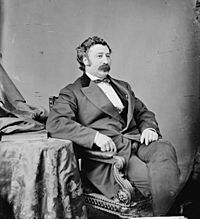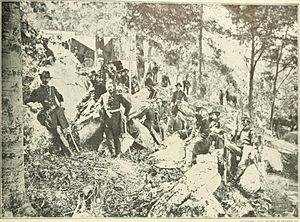James S. Negley facts for kids
Quick facts for kids
James Scott Negley
|
|
|---|---|

James Scott Negley
|
|
| Born | December 22, 1826 Pittsburgh, Pennsylvania |
| Died | August 7, 1901 (aged 74) Plainfield, New Jersey |
| Place of burial |
Allegheny Cemetery, Pittsburgh, Pennsylvania
|
| Allegiance | United States of America Union |
| Service/ |
United States Army Union Army |
| Years of service | 1846–1848, 1861–1865 |
| Rank | |
| Battles/wars | American Civil War |
| Alma mater | University of Pittsburgh |
James Scott Negley (born December 22, 1826 – died August 7, 1901) was an important general during the American Civil War. He was also a farmer, worked with railroads, and served in the U.S. House of Representatives for Pennsylvania. He played a big part in the Union victory at the Battle of Stones River.
Contents
Early Life and Military Service
James Scott Negley was born in Pittsburgh, Pennsylvania. He went to public schools and later graduated from the University of Pittsburgh.
When he was younger, Negley joined a group of volunteers called Company K of the Duquesne Greys. He fought with them in the Mexican–American War from 1846 to 1848. After the war, he became a farmer and grew plants.
Civil War Contributions

When the American Civil War began in 1861, James Negley quickly became a brigadier general in the Pennsylvania Militia. He helped gather many volunteers from Pennsylvania.
Negley led his troops in the Shenandoah Valley in 1861. Later, he was put in charge of the 7th Brigade. He also led a successful mission against Chattanooga, showing the Union Army could strike deep into enemy lands.
Key Battles and Commands
In November 1862, Negley was promoted to major general of volunteers. He took command of the 8th Division. This division later became the 2nd Division in the XIV Corps.
During the Battle of Stones River, Negley led a strong counterattack. This helped the Union Army win on the second day of fighting. He also commanded his division during the Tullahoma Campaign and the Battle of Chickamauga.
Before the Battle of Chickamauga, Negley's division almost got trapped. But they managed to escape in what was called the Battle of Davis' Crossroads. After the Union lost at Chickamauga, Negley was removed from command. However, he was later found not guilty of any wrongdoing. He resigned from the army in January 1865.
Fort Negley, a large stone fort built in Nashville, Tennessee in 1862, was named after him.
Life After the War
After the Civil War, James Negley continued to serve his country.
Political Career
He was elected to the United States Congress as a Republican in 1868. He served in Congress from 1869 to 1875. He was re-elected in 1884 and served again from 1885 to 1887.
In 1877, during the Pittsburgh Railway Riots, Negley helped keep order in Pittsburgh. He commanded the local militia.
Later Work and Legacy
Negley also served on the board of managers for the National Home for Disabled Volunteer Soldiers. This organization helped soldiers who were injured in the war.
After leaving politics, he worked in the railroad business. The town of Negley, Ohio was named after him. It was founded by a railroad line he was involved with.
James Scott Negley passed away in Plainfield, New Jersey, at the age of 74. He is buried in the Allegheny Cemetery in Pittsburgh.

